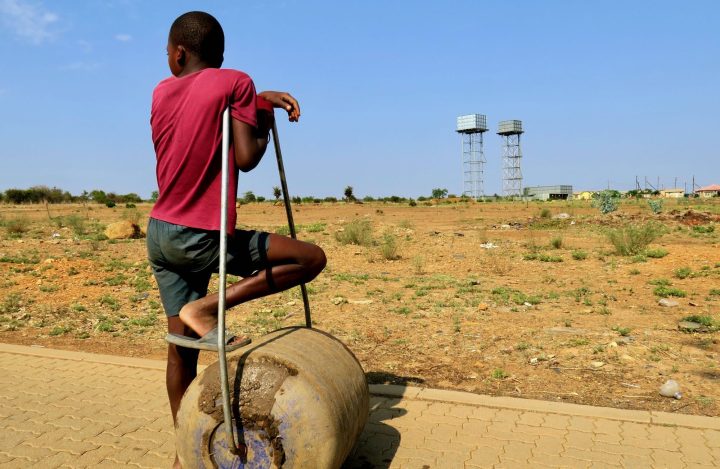GROUNDUP
Two thirds of municipalities fail to provide clean drinking water, yet recourse shortcomings prevail

Currently the Department of Water and Sanitation cannot directly intervene when municipalities fail to supply drinking water up to standard.
Almost two-thirds of water-supplying municipalities (94 of 144) were failing to provide clean drinking water to residents in 2022. In 61 municipalities water treatment and supply was in “a critical state” according to the latest Blue Drop Report. Yet the Department of Water and Sanitation (DWS) cannot intervene directly to address this.
Under current water legislation, the department’s only recourse is for the minister “in consultation with the Minister for Provincial Affairs and Constitutional Development” to “request the relevant Province to intervene in terms of section 139 of the Constitution”.
A section 139 process allows the provincial government to place a municipality under administration if it fails to meet its constitutional obligations. This process is time-consuming and requires much political will.
Associate professor Germarie Viljoen, a senior law lecturer specialising in water law at North-West University, says she is “rather sceptical” about the effectiveness of the section 139 process, “given the urgency often associated with water services”.
“The reliance on time-sensitive decisions and political motivations makes it an uncertain solution in many instances,” said Viljoen.
It requires one tier of government holding another to account, which “may not always be forthcoming”. A provincial Member of the Executive Council (MEC) for local government has to demand information from an errant municipality, conduct investigations, and assume responsibility for enforcing minimum norms and standards.
New Bill
The Water Services Amendment Bill, introduced to Parliament in November, seeks to strengthen enforcement by allowing the department to issue directives to municipalities that fail to provide clean drinking water.
Should a municipality not comply with a directive to meet minimum standards within the required time frame, the Bill would allow the water minister to appoint “any water services institution” to take over “all the duties” related to water provision. This includes operations, maintenance, refurbishment and expansion, as well as billing and revenue, procurement, supply chain management, and human resources.
Any expenses incurred may be recovered from the municipality.
But similar directives issued under the National Environmental Management Act (Nema) — for failure to meet wastewater treatment standards — have often been ignored or have taken years before having an effect. Many municipalities fail to even respond to such directives.
DWS spokesperson Mavasa Wisane said of 88 notices and directives issued to municipalities in the 2022 financial year for pollution of the environment, 71 “remain unaddressed”. Wisane said of the 17 municipalities that did respond, only eight provided representations that “adequately addressed the concerns raised”.
Read more in Daily Maverick: Hammanskraal cholera outbreak ‘represents the ears of the hippopotamus’ of SA’s wastewater treatment crisis
She said the DWS was conducting follow-ups on the notices and directives issued to ascertain compliance, and would take “further enforcement action” if required.
The DWS had also opened nine criminal cases against municipalities in the 2022 financial year for polluting water sources, and a further 10 in the 2023 financial year. None of these cases have been finalised.
Regarding directives that would flow from the Water Services Amendment Bill, Center for Environmental Rights candidate attorney Adelaide Chagopa said, “If the Bill passes in its current iteration, I personally do not think the directives clause will immediately make much of a difference.”
Chagopa said the department’s capacity to hold scores of failing municipalities to account was questionable. However, this issue might be addressed during the Bill’s comment process.
She said she believed punitive measures were necessary to hold municipalities responsible for providing clean drinking water. “I don’t know what punitive measures would or should look like in law but I do believe there is a need for more severe consequences for failure to discharge functions,” she said.
Wisane said most public consultations for the Water Services Amendment Bill, as well as the National Water Amendment Bill currently before Parliament, would take place in February. Once the necessary updates were made, it would have to be resubmitted to Cabinet for approval to submit to Parliament and proceed through the parliamentary processes. She indicated the process may be slowed by it being dealt with during an election year. DM
First published by GroundUp.





















 Become an Insider
Become an Insider
I would wager that almost all of these municipalities are ANC-“led.”
People get the government they deserve. ANC voters’ poor choices at the ballot box, lead to their taps running dry. This situation will persist until they (miraculously) develop the mental ability to make the connection between their power to vote and their circumstances.
Logic would also tell you that most municipalities are rural and have never had water wholly palatable
The provision of clean drinking water is one of the basic functions of a Municipality. If they can’t get that right, what hope is there of getting any other services right.
Many Municipalities’ income is spent on staff salaries and benefits instead of the provision of services. Staff make sure they get paid before they worry about providing services. The staff compliments have doubled in some cases, along with housing subsidies, car allowances, overtime, medical and pension contributions. It’s not surprising the provision of services has suffered.
In one instance a Municipality persuaded a mining company to pay 3 months in advance for electricity so they could pay staff salaries !!!
With out the necessary skills and a change in the greedy money grabbing feeding at the pig trough this will be impossible. With the current government in power not in a thousand years!
Both Water Services Amendment and National Water Amendment Bills are not yet tabled at Parliament. There is no record of these bills being table in Parliament in November 2023. I presume the original authors confused the National Water Resources Infrastructure Agency Bill with these Bills. This article is misleading and misinforming the public